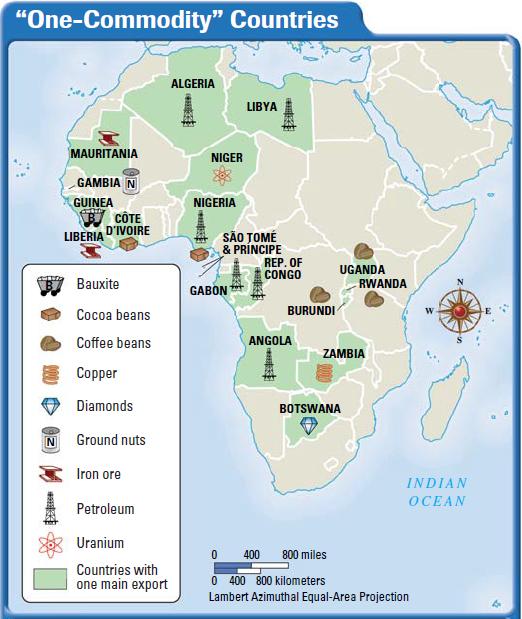Africa: Economic Development
A HUMAN PERSPECTIVE Mauwa Funidi wonders about the future of her country, the Democratic Republic of the Congo, as she looks around the rundown university library where she works. She has not been paid her salary of 12 dollars per month in many months. Classes at the university have been suspended because of a lack of funds. Funidi survives only by selling little bags of charcoal on the streets of Kisangani. Funidi, like many other Africans, is trying to scrape out a living on a continent where people's standard of living has gotten worse over the last 30 years. Nevertheless, many African countries have vowed to change their fortunes with better government, better relations with neighbors, more investment in education, and a diverse economy.
Africa's Economy Today
Most African nations have little manufacturing of their own. Their economies are based on providing raw materials—oil, minerals, or agricultural products—to the world's industrialized countries.
A HISTORY OF PROBLEMS
As you learned in the previous chapter, European colonizers exploited Africa's resources and people during the past few centuries. Millions of Africans were sold into slavery, and countless others have died in Africa from harsh working conditions while obtaining raw materials for foreign interests. In addition, the land has been mined and drilled with little regard for the environment. This history of exploitation has limited Africa's economic growth and fostered political instability. Without political stability, consistent economic growth is difficult.
AFRICA'S ECONOMIC STATUS
Today, most African countries are worse off economically than they were in the 1960s, just after many of them gained independence from European colonizers. In the last 30 years, average incomes in Africa have decreased, while they have increased in most of the rest of the world. Africa accounts for only 1 percent of total world GNP and 1.5 percent of total dollar value of world exports—both small numbers compared to Africa's population and natural resources. The whole of Africa's economy is about as large as that of Argentina's.
Furthermore, the economic infrastructure needed for substantial growth is not in place. Roads, airports, railroads, and ports are not adequate to help African nations further their economic growth.
In addition, most Africans don't have access to computers or other aspects of high technology. High technology has fueled economic growth in other parts of the world such as North America, Europe, and Asia.
On the Road to Development
Despite this legacy of exploitation, African nations are struggling to build economies based on the careful use of natural and human resources.
REDUCING DEBT AND INCREASING COOPERATION
When the colonial nations pulled out of Africa, they often left the newly independent nations without money for transportation, education, and businesses. To build their economies, African countries borrowed heavily. By 1997, total public debt of sub-Saharan African governments—about 227 billion dollars—was strangling them. As a result, many Western leaders have urged their countries to forgive Africa's debts so that it has more money to build its economies.
Another way that Africa seeks to improve its economy is through regional cooperation. The Economic Community of West African States (ECOWAS) and the Southern African Development Community (SADC) are both striving to promote trade. For example, ECOWAS is working toward removing duties and creating a common currency. Efforts of SADC include working to improve the transportation and communication infrastructures.

BUILDING INDUSTRIES
The economy of many African nations is based on the export of raw materials.
Furthermore, several of Africa's countries rely on just one or two principal commodities for much of their earnings.
These are called “one-commodity” countries. A commodity is an agricultural or mining product that can be sold. The value of a commodity varies from day to day based on worldwide supply and demand. That makes the economies of the producing nations—especially “one-commodity” countries—unstable. Economists believe African nations must diversify, or create variety in, their economies and promote manufacturing to achieve economic growth and stability.
Some African nations are making strides toward that goal. In East Africa, Djibouti is using its location on the Gulf of Aden to establish a major international shipping center.
Educating Workers
A key to developing Africa's economies is improving its education system to provide people with a high level of skills. African nations must also find ways to prevent their educated citizens from leaving the continent.
IMPROVING EDUCATION
A large barrier to economic development in Africa is an unschooled population. For example, the average length of school attendance for African women has increased only by 1.2 years in the last 40 years. In some countries, such as Angola and Somalia, civil wars have all but destroyed the school systems.
Some African countries, however, are making progress. For example, in Algeria, 94 percent of the country's school-age population receive a formal education. Mauritius has also made huge gains. Currently, 83 percent of Mauritians over the age of 15 are literate.
REVERSING THE BRAIN DRAIN
Another priority is slowing the departure of African professionals to Western countries. In 1983, the International Organization for Migration began a campaign to encourage these professionals to return home.
As Africa moves into the 21st century, efforts to improve education, invest in industry, and create stable governments provide hope for the future.